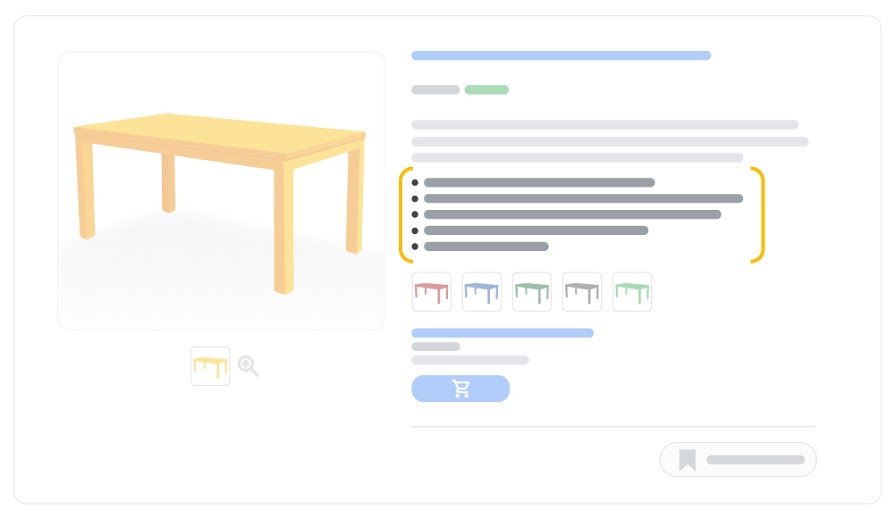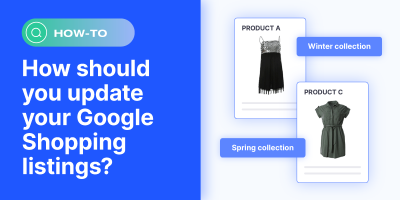Google recently updated its product data specifications for shopping feeds, which may impact your campaign results. These updates include new attributes that merchants can input and recommendations to follow to ensure your ranking will not dip. Some changes are going into effect immediately, and some will go into effect on September 1, 2020.
Product Highlights
One of the biggest changes is the addition of the [product_highlight] attribute. This attribute is optional, and appears as a bullet point beneath the product description. This is where you can put short sentences (max 150 characters per highlight) that quickly explain your product’s best features or answer common questions about the item.
If you use [product_highlight], you must include at least two, but no more than 10—this is a repeated field. Google recommends using four to six. Product highlights should be easy to consume and not use SEO keywords. Make sure you’re only talking about your own product, not comparing it to competitors or sharing general information about your brand. Product highlights should help customers learn key information about your product at a glance. The change goes into effect immediately.

Product Highlights appear beneath the description. Image source: Google
Product Details
The [product_detail] attribute is also optional, and can be used to provide tech specs in a bulleted list that’s easy to read. For example, if you’re selling a laptop, you might want to include information about the memory, operating system, and display here. You could use the [product_detail] to provide digestible information, with the necessary subattributes: [section_name], [attribute_name], and [attribute_value]. You can also provide product details without a [section_name], and only include the attribute name and value. This change also goes into effect immediately.
This is how some [product_detail] attributes for a laptop might look:
- Memory
- 256GB SSD Storage
- 8GB DDR3 16MHz RAM
- Display
- Super awesome patented color technology
- Non-glossy
- 15-inch diagonal
- 1920 x 1080 pixel resolution
Installment and Subscription Cost
The [installment] attribute and [subscription_cost] attribute are both optional, but are useful for providing the details of a payment plan, monthly contract, or annual plan. These attributes should only be used if you’re selling mobile devices—if you use them for products within other product categories, your products may get disapproved. This goes into effect immediately.
Sale Price Annotations
If you are offering a sale price, the original price must have been listed for at least 30 days (consecutive or non-consecutive) in the past 180 days. Previously, the review period was 200 days. This goes into effect immediately.
Updated Best Practices Coming in September
Google has stated that not including [gender], [age_group], [size], and [color] for products in Media or Apparel & Accessories categories will hurt your search rankings. Your ads will still be eligible to serve, but you will lose out to other listings with more robust data.
Regardless of category, not including [description] will also hurt your search rankings, but your products will still be eligible to show. Google will give search preference to products with descriptions vs. products without descriptions.
Finally, if you are including multiple values for the [material] or [pattern] attributes, you must separate them with slashes or hyphens. Products that use commas will receive a warning. Similarly, you should not include multiple image URLs for the [image_link] attribute, but instead list additional images using the [additional_image_link] attribute.
For more information about the updates above, see Google’s announcement.
An optimized product feed is becoming more important every day. Google rewards the sellers that provide accurate and complete data, and follow best practices. If you’re looking to make your product listings more competitive, Feedonomics is here to help!

Brian Roizen is the Cofounder and Chief Architect of Feedonomics, a full-service feed optimization platform that optimizes product data for hundreds of channels. He has been featured on numerous podcasts and eCommerce webinars, and regularly contributes to Search Engine Land and other industry-leading blogs. Brian graduated summa cum laude from UCLA with both a Bachelor’s and Master’s degree in Mechanical Engineering.

